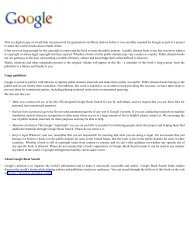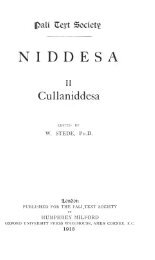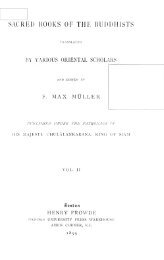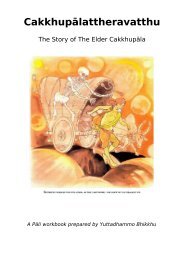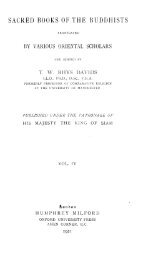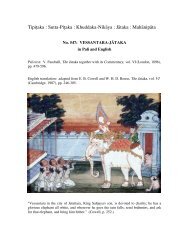Lessons In Practical Buddhism - Sirimangalo.Org
Lessons In Practical Buddhism - Sirimangalo.Org
Lessons In Practical Buddhism - Sirimangalo.Org
You also want an ePaper? Increase the reach of your titles
YUMPU automatically turns print PDFs into web optimized ePapers that Google loves.
premise (that such mind states allow one to cling and reject)<br />
requires the conclusion (that clinging and rejection are good)<br />
for it to have any meaning. <strong>In</strong> truth, it is not enough to say<br />
that something allows us to fulfil our desires; we must be<br />
certain that our desires, once fulfilled, will truly bring us<br />
peace and happiness. If they won’t, we must reject them<br />
outright if we are to be true to our goal.<br />
A meditator must make an ardent effort to do away with<br />
thoughts based on desire, ill-will, or delusion when they<br />
arise. Thoughts regarding sensual pleasure will only serve to<br />
sodden the mind if pursued; thoughts of anger will cause the<br />
mind to boil over like a pot of water over a fire, and delusion<br />
will cloud the mind like a room full of smoke. We must be<br />
quick to recognize such thoughts as they arise and grasp<br />
them objectively, rather than identifying with or clinging to<br />
them.<br />
When we engage in fantasizing about things like romance,<br />
adventure, society, even food and possessions, it can bring<br />
great pleasure while we pursue the fantasy. Only once our<br />
mind becomes tired and worn out from the excessive mental<br />
activity will we realize how taxing it is on the system, and<br />
only over time will we gradually come to see how we have<br />
become addicted to illusion, preferring it over reality and<br />
falling into deeper and deeper depression whenever we are<br />
forced to face the imperfect reality around us. True<br />
happiness can only come in relation to what is real; fantasy<br />
and illusion dry up the mind like freshly cut grass, as the<br />
Buddha explained to a certain angel in the Saṃyutta Nikāya<br />
(SN 1.10). The angel, seeing the monks living in great<br />
austerity and yet appearing to be quite happy and content,<br />
asked:<br />
“araññe viharantānaṃ, santānaṃ brahmacārinaṃ.<br />
ekabhattaṃ bhuñjamānānaṃ, kena vaṇṇo pasīdatī”ti.<br />
“For those in forests dwelling, peaceful ones living a life<br />
sublime,<br />
eating only a single meal, how does their colour shine?”<br />
It seems that this angel had spent some time watching the<br />
monks meditate in the forest, and noticed how when they<br />
52




